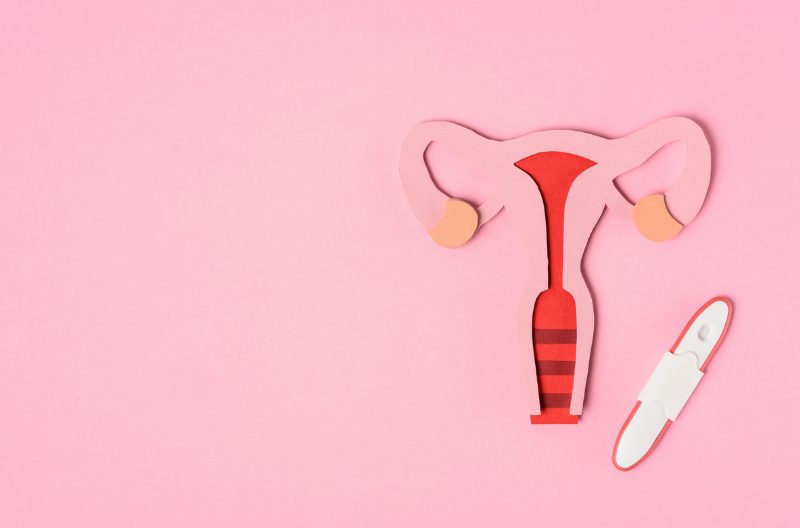If you’ve ever had a late period, then you understand that it brings instant panic. The first thought, without hesitation, is “am I pregnant”? But if that possibility has been ruled out by a negative pregnancy test, we try to work out all the possible options of what is happening. Is everything okay? Is it a cyst or a tumor? During this stressful time, we often turn to Google to ask: why is my period late if I’m not pregnant?
The truth is, it happens to healthy people who are under physical strain or stress. There are multiple possible reasons for your late period that need not cause alarm. It could be from a change in weight, stress, or birth control. Or, it could be a sign of something more serious. But before more panic sets in, let’s explore the options and their protocols first.
Below, we have compiled relevant scientific findings behind the possible reasons why your period is late. This should help you determine whether or not you need to worry at all. There are 12 reasons in total, complete with an explanation of each, symptoms to look for, and what to do. We’ll also tell you when you should schedule an appointment with your doctor.
Why is My Period Late if I’m Not Pregnant?
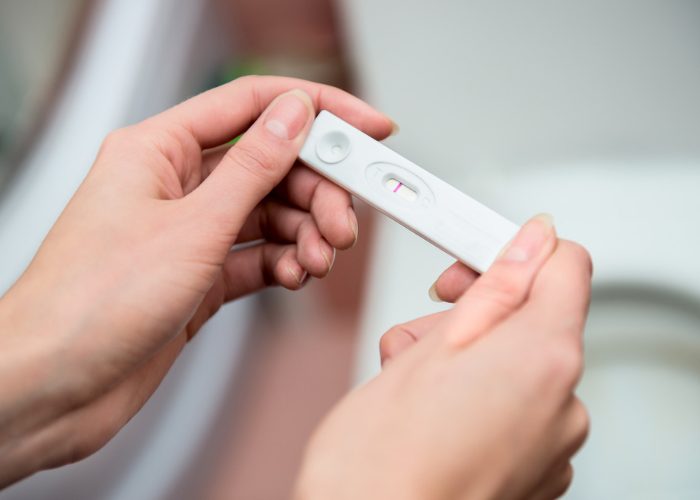
Late period, but a negative pregnancy test? We have all asked this question at least once in our lives, and there can be numerous reasons for it. But how late can your period be before you should worry? Two days late? Six days late? Ten days? Two weeks? And when is it missed?
A normal period cycle lasts between 28-35 days. A menstrual period is considered “late” if it hasn’t started five or more days after the day you expected it to start. It is considered “missed” if you have had no menstrual flow for at least six weeks after the start
Some women experience an irregular flow for every period. So, if you have had periods for two years or more and your physical exam is normal, your irregular periods may simply be your normal pattern. An irregular pattern consists of periods as close as two weeks together or as far as three months apart.[2]
A couple of irregular periods per year are normal.[3] However, if you experience vast irregularities with frequency, consult with your healthcare professional just to be sure.
Start keeping tabs on a calendar when each period starts and stops. Consider using a late period calculator on the internet to help determine if it’s even late at all. And, regardless of whether there is a serious issue, you will have the actual dates of your menstrual cycle. This information can also help your healthcare provider make a correct diagnosis.
Barring that, continue reading to see if the reason for your late period is listed below.
12 Possible Reasons for a Late Period
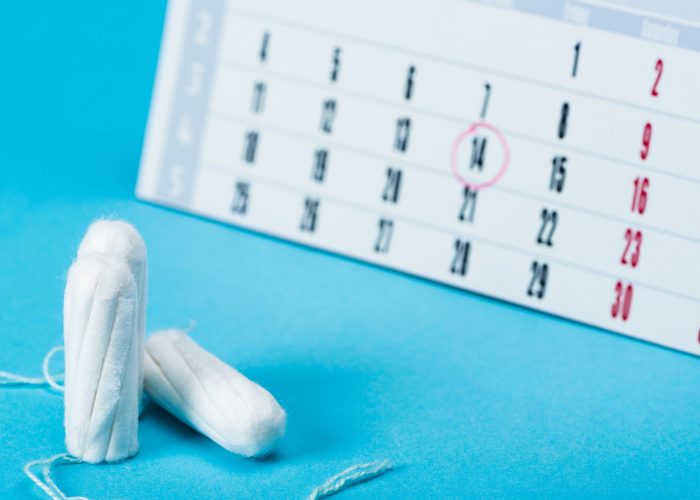
As women, we often consider our monthly cycle to be the barometer of our good health. Its automatic function lets us know we are healthy. So, when we experience a late period, it signals that something is happening on a level that we cannot yet identify or control. We wonder what are the causes for it, even though we are not pregnant.
Among the causes of a late period, there are two types of risk factors for a late period: modifiable and non-modifiable.[4]
Modifiable reasons are those that include medications, low weight or obesity, stress, or illnesses that can be cured, among others. Non-modifiable reasons are chronic diseases or medications, like anticonvulsants, antidepressants, or antipsychotics.
Each of the reasons below will list the symptoms of each condition, what is happening inside your body
Reason 1: Stress

Stress is a physical result of its own overworked hormone, cortisol. Cortisol can overtake your menstrual cycle.[5] Too much cortisone in the bloodstream can cause a late period.[6] And, it can interfere with the part of our brain that controls the hormones that regulate your cycle.[7]
Many studies show a link between stress and late periods.[8] In fact, several studies on university students with infrequent or late periods show the subjects all scored very high on stress tests.[9] Thus, high-stress levels could be a reason for a late period.
Symptoms of Stress
- Late periods
- Lighter or short periods
- Missed periods
- Spotting between periods
- Upset stomach
- Hair loss or breakage
- Skin eruptions
- Disrupted sleep
- Fatigue
- Overeating or undereating
What to Do
If you recognize that stress could be the cause of your late period, try some stress-reduction techniques. Doing lightweight exercises during your lunch break, taking short breaks between tasks, deep-breathing exercises, or laughing with a friend are all great stress-relievers. Taking supplements like St. John’s Wort and Gingko Biloba can also help reduce stress.
Perhaps the one good thing about being stressed is that there are so many stress-busters out there. From carving out some “me time” to doing a small act of kindness, there are plenty to choose from. Just try to find the one that works effectively for you.
Reason 2: Very low weight

Being underweight is classified as being at least 10% less than the normal body weight for your height. Another measure is if your Body Mass Index is under 10.
When you are severely underweight, your body goes into starvation mode. It can shut down the body’s production of the follicle phase of the reproductive system, so eggs are not even created to be released.[10]
Low body weight could be due to illness, medication, or dietary changes. Alternatively, it could also be due to over-exercising or under-eating.[11] Finally, it may also be a symptom of anorexia nervosa or bulimia.
Symptoms of Very Low Weight
- Late periods
- Missed periods
- Stopped periods
- Difficulty with fertility
- Hair loss
- Fatigue
- Dizziness or fatigue from anemia
- Frequent sickness
What to Do
If you are severely underweight and experiencing late period but are not pregnant, consider regulating your meals to eat a sufficient amount for your physical activity. If you have severely low body weight due to illness, medication or dietary changes, and your period is late, consume sufficient nutrient-dense foods and proteins to protect your health and reproductive cycle, and to prevent late periods.
Reason 3: Obesity

Being obese means you are at least 30 pounds above the normal weight for your height. It can also mean you have a Body Mass Index of 30 or more.[12]
Obesity is generally caused by eating more calories than you consume.[13] Specifically, the calories often come from fatty or sugary foods and accumulate because of an overly sedentary lifestyle.[14]
When you are obese, your body creates a surplus of oestrogen. Oestrogen is one hormone that helps regulate your reproductive system. So, high levels of oestrogen can be a cause of a late period, or even no period at all.[15] Also, an underactive thyroid gland or hypothyroidism can also cause a late period.[16]
Symptoms of Obesity[17]
- Late periods
- Missed periods
- Stopped periods
- Type 2 diabetes
- Coronary heart disease
- Stroke
- Some types of cancer
- Depression
What to Do
The best way to control obesity is to restrict your diet to a natural, reduced-calorie diet. Exercising daily for 30-60 minutes is a necessary part of reducing obesity.[18]
Reason 4: Polycystic Ovarian Syndrome (PCOS)
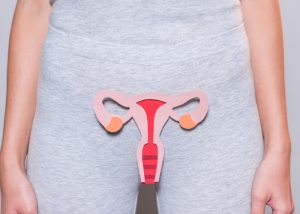
Polycystic Ovarian Syndrome (PCOS) is an insulin-sensitive condition. Women with PCOS either produce too much insulin, or are insulin-resistant.[19]
PCOS prevents the ovaries from producing enough hormones to mature your eggs. In a typical menstrual cycle, each ovary develops roughly five follicles that start to grow and fill with fluid. With PCOS, women often have more than five follicles, which take longer to grow and fill with fluid. These extra follicles delay this phase of the menstrual cycle and cause late periods.
Additionally, PCOS is accompanied by increased levels of a testosterone-like hormone, androgen, another cause of a late period.[20] Other symptoms of PCOS include thick hair growth on the face and breasts.
Symptoms of Polycystic Ovarian Syndrome (PCOS)
- Late periods
- Three or more missed periods in one year[21]
- Not beginning menstruation nor forming breasts by age 16
- Infertility
- Unwanted body hair
- Weight gain
What to Do
Doctors often prescribe birth control pills to regulate hormones, metformin to prevent diabetes, statins to control high cholesterol, and hormones to increase fertility and remove unwanted hair.
A progesterone prescription can be taken for two weeks and then stopped to simulate a normal period cycle.
Also, there are natural ways to balance your hormone levels, to balance out your menstrual cycle.[22] You can eliminate gluten and dairy, and eat low-glycemic index foods. With PCOS, the more insulin there is in your body, the more testosterone the ovaries produce.[23] Gluten, dairy, and high-glycemic foods all create insulin in the body. Controlling insulin is one way for PCOS sufferers to regulate their menstrual cycle and eliminate the cause of a late period.
Reason 5: Chronic diseases
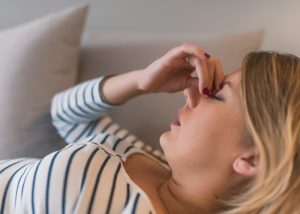
Chronic illnesses are diseases that last for three months or longer. Conditions like
It may be due to the body functioning under too much stress while trying to resolve the major illness. Couple that with the inability to absorb nutrients or no appetite, and it can cause a late period. Add to that constant inflammation along with multiple medications that accompany chronic illness. It all adds up
Conversely, the menstrual cycle often exacerbates symptoms of illness.[25] So, the illness may also feel worse during our cycles.
Stress and sickness may overtake our menstrual cycle, causing a late period. Conversely, we may take medications to stop our
Symptoms of chronic diseases
- Late periods
- Stopped menstruation
- Suppressed menstruation
- Hypoestrogenism[26] (hot flushes, headache, vaginal dryness, and sleep disturbances)
- Obesity
- Polycystic ovaries[27]
- Chronic illness
- Stress
- Disability
- Disturbed sleep
- Fatigue
- Pain
- Body aches
- Anxiety
- Depression
- Headaches
What to Do
When facing a chronic illness, your healthcare practitioner will be able to explain some of the side effects that may cause a late period, either due to the disease or to its treatment and medications.
Often, finding the right chemical mix to alleviate the pains and symptoms associated with a chronic illness will have an effect on your
Reason 6: Early perimenopause
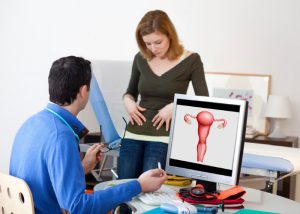
The average age women in the U.S. experience menopause is between 48 and 55. But women who experience early perimenopause start having late periods by age 39. Instead of the standard 28 days between periods, menses may arrive 36 or 48 days apart.
Women typically experience 4-8 years of changes upon starting menopause.[28] However, in perimenopause, it can last as short as just a few months.[29] If you’re under 45 and your period stops completely, it’s possible you’re going through early perimenopause or experiencing premature ovarian failure.
Symptoms of early perimenopause[30]
- Late periods
- Short periods
- Stopped periods
- Hot flashes
- Breast tenderness
- Worse premenstrual syndrome
- Low sex drive
- Fatigue
- Sleep disturbances
- Vaginal dryness
- Urinary leakage when coughing or sneezing
- Depression
What to Do
If the symptoms of perimenopause set in, you can contact your healthcare professional to assess if that is the cause of your late period. While perimenopause cannot be stopped or reversed, there are prescription remedies that can help alleviate some of the
Selective serotonin uptake inhibitors (SSUI), Neurontin, Prozac, Paxil, and clonidine can all help with hot flashes, while low dose birth control pills can help with hormonal irregularities, vaginal dryness, and heavy bleeding.[31]
Reason 7: Hypothyroidism

In people with late periods, 44% have thyroid disorders.[32] Hypothyroidism is a direct cause of a late period: it affects ovulation, fertility, and even sex drive. Menstrual problems tend to be greater with severe hypothyroidism, as opposed to mild or moderate hypothyroidism.[33] Hypothyroidism attributes infrequent or late periods because it causes a failure to ovulate.[34]
Due to this, women with hypothyroidism have a difficult time getting pregnant.[35] They also suffer an increased risk of miscarrying in the first trimester. Thyroid replacement therapy (levothyroxine) can cure infertility, however, it still doesn’t resolve this as a cause of late periods.[36]
Symptoms of hypothyroidism
- Late periods
- Infrequent or absent menstrual cycles[37]
- Premenstrual spotting
- Infertility
- An abnormal milky discharge from the breasts (galactorrhea)
- Symptoms of menopause, such as hot flashes and vaginal dryness
- Fatigue
- Hair loss
- Elevated cholesterol
- Dry skin
- Impairs insulin sensitivity and may be linked to PCOS
- Reduces sex hormone binding globulin
What to Do
Because of the prevalence of thyroid disease among women with menstrual problems, if you experience long-term or frequent irregularities, ask your healthcare professional for guidance on potential thyroid issues.
Many different medications can help balance out your thyroid and its accompanying symptoms.
Reason 8: Pituitary tumor
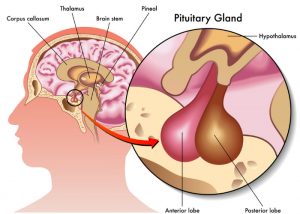
Your pituitary gland is the size of a pea and is situated in the bony hollow just behind the bridge of your nose.[38] Sometimes, a tumor or growth develops behind the pituitary gland called a prolactinoma.
A prolactinoma secretes a hormone called prolactin.[39] Before menopause, high prolactin levels cause a late period.[40] It can also cause abnormal breast milk production without breastfeeding.[41]
In a study of patients with prolactinoma studied over four years, 77.5% had irregular or late periods, with periods more than seven days late.[42] There are two categories of prolactinoma: micro prolactinoma (
Symptoms of a pituitary tumor
- Menstrual changes
- Irregular or missed periods
- Loss of periods
- Loss of interest in sex
- Infertility
- Headaches
- Blurry vision
- Eye muscle weakness
- Discharge from the breasts even though not breastfeeding
- Loss of peripheral visions
- Sudden blindness
- Nausea
- Weakness
- Unexpected weight loss or gain
- Osteoporosis
What to Do
Prolactinoma can be found when a blood test for high levels of prolactin.[44] It can also be found by conducting an imaging test. A magnetic resonance imaging (MRI) scan is the preferred imaging test, although a computed tomography (CT) scan is also possible.[45]
Prolactin excess in the blood is treatable with dopamine agonist therapy.[46] It can also be treated with 5mg of cabergoline per day. In one study on 58 patients, cabergoline restored normal menstruation to 91% of the patients with micro prolactinoma, and 64% of those with macroprolactinoma.[47] In patients whose menstruation cycles were not restored to normal, it was discovered that they had outstanding issues, including PCOS and hypothyroidism.[48]
Reason 9: Recently started (or re-started) periods

Women who have not had a period due to contraceptive use, hormonal therapy, or illness might not resume having a regular period every month right away or it may cause very late periods.
To prevent late periods, here are some statistics when you stop contraceptive use and start ovulating, as determined in a study of 7,000 women:[49]
- 1% of women who stop taking the pill have a delayed period for longer than 6 months.
- Pregnancies are slower to occur in the first 3 months after stopping contraception, for up to 24.8% of oral contraception users.
Several studies assessed whether oral contraceptives deplete certain nutrients.[50] The outcome is that they do. Key nutrient deficiencies are folic acid, vitamins B2, B6 and B12, vitamins C and E, and the minerals magnesium, zinc, and selenium, all of which can be the cause of your late period.[51]
Symptoms of recently started/re-started periods
- Late periods
- Irregular periods
- Missed periods
- Spotting between periods[52]
What to Do
Doctors who restore a regular menstrual cycle after years of birth control suggest several things. First, replenish nutrients. Make sure that you eat well-balanced meals and consider taking a supplement to restore some of the nutrients lost.
Folic acid, vitamins B2, B6 and B12, vitamins C and E, and the minerals magnesium, selenium and zinc can help normalize late periods. Vitamin B6 supplementation has been shown to regulate menstrual cycles in women who have not menstruated for months or even years.[53] Also, eating enough carbs and sufficient calories for your activity level, and getting enough rest all help get your menstrual cycle back on track.
Reason 10: Medications

One study concerning antidepressants conducted on 1,432 women found that several types of antidepressants cause late periods in 14.5% of the women studied.[54]
But this effect is not limited to antidepressants. In fact, several types of prescription medications such as antipsychotics, anticonvulsants, and some chemotherapy medications can also cause late periods. In a study on the effect of antiepileptic drugs, valproate was the cause of late periods, more so than carbamazepine.[55] Chemotherapy can also damage the ovaries, possibly leading to late period or menopause.[56]
Symptoms of medications affecting menstruation[57],[58]
- Late periods
- Long or short periods
- Missed periods
- Sexual problems
- Reduced fertility
- Androgenization
- Polycystic ovaries
- Menopausal symptoms (hot flashes, mood swings, and vaginal dryness)
What to Do
Decrease the dose or change medications, if possible (but make sure to seek advice of your doctor first). In particular, most symptoms are at least partly reversible after discontinuing
Reason 11: Menstrual synchrony (syncing up)

As women, this has probably happened to you at some point in your life. Typically, your period cycle syncs up with other women in close quarters, including roommates, coworkers, friends, or family.
Surprisingly, the science on menstrual synchrony is 50/50. The methodology of collecting data and verifying actual menstrual start dates
The concept first appeared in print in 1971 when an undergraduate at Wellesley College, Martha K. McClintock, noticed that all the women in her dorm had a “similar date of onset” of their menstrual cycles.[60] Her research was published in Nature journal, and menstrual synchrony was considered verified.[61] But then, in 1995, researcher H. Clyde Wilson doubted McClintock’s sample selection and method of determining period start dates, He published his own research debunking the “McClintock effect.” Thus, the fact that women do not start their periods on the exact same day debunked the McClintock effect.[62]
After that, no study has ever found women’s menstrual cycles sync to each other. In fact, it has been further debased because it is also uncommon in the animal kingdom. As it stands today, scientists consider menstrual synchrony to be caused by our mutual environments, rather than a pheromone-based instinct that syncs biological rhythms.
Symptoms of Menstrual Synchrony
- Late periods
Time between periods is shorter or longer- Longer or shorter periods
What to Do
If you are synced with the women at home or at work, it takes 4-6 months to complete the process. Then, you or they may experience shorter or longer periods, or shorter or longer ovulation times. It causes no damage, nor is it the symptom of another issue. But, it may be the cause of your late period.
Reason 12: Smoking

A study of 408 women smokers tested the regularity of their periods.[63] This study used biological measurements rather than self-reporting methods to make its determinations.
Heavy smokers who smoke a pack of cigarettes or more per
This was caused by a shortened follicular phase.[66] The follicular phase is when eggs begin to form in the ovary. At that stage, there are between 5-20 eggs that compete to be the one that gets fertilized. If this phase of ovulation is shortened, as it is for heavy smokers, fewer eggs fight to be reproduced, and can cause late periods.
Moderate smokers (ten or more cigarettes per day) also experienced late periods at variable lengths.[67]
In another study, heavy smoking was also associated with early onset menopause.[68] Women smokers aged 44-55 go through menopause 1.8 years earlier than non-smokers.
Symptoms of Smoking[69]
- Late periods
- Longer or shorter period duration
- Anovulation occurs more frequently (failure to release an egg, or missed periods)
- Early menopause
What to Do
Quitting or decreasing smoking now encourages a healthy reproductive system. According to a study at the Perelman School of Medicine at the University of Pennsylvania, quitting during the second phase of menstruation makes it easier to stop.[70] The follicular phase, as eggs form, is when there is less activity in the brain regions that help us make good decisions and in the reward
The second phase is the pre-menstrual
Remember to reach for carrot and celery sticks instead of cigarettes or alcohol to avoid relapse or shifting addictions!
When You Should Schedule a Trip to the Doctor

Heading to the doctor’s office because of your late period can bring a lot of stress. It could mean any one of the 12 things listed above, or maybe it is nothing at all.
Below is a short list of key questions to consider before making a doctor’s appointment regarding your late period.[72]
- Have you had dry skin, hair loss, or a change in weight (hypothyroid)?
- Do you have abnormal body hair (PCOS)?
- Have you gained weight (obesity) or are severely underweight (anorexia/bulimia)?
- Do you normally have regular menstrual cycles? How many menstrual cycles do you normally have per year?
- Is your bleeding always heavy or prolonged?
- How long ago did you develop irregular periods or late periods? How often per year?
- Are you sexually active?
- When was your last period?
- Have you ever had difficulty getting pregnant?
Here are the tests will likely perform to begin resolving your issue:
- Medical history
- Physical examination
- Blood tests
- Ultrasound examination
- Endometrial biopsy—a small sample of the uterus’s endometrial lining is taken to be examined under a microscope
- Hysteroscopy—a diagnostic scope that allows a health care provider to examine the inside of the uterus, typically done as an outpatient procedure
- Saline infusion sonohysterography—ultrasound imaging of the uterine cavity while it is filled with sterile saline solution
- Transvaginal ultrasonography—ultrasound imaging of the pelvic organs, including the ovaries and uterus, using an ultrasound transducer that is inserted into the vagina[73]
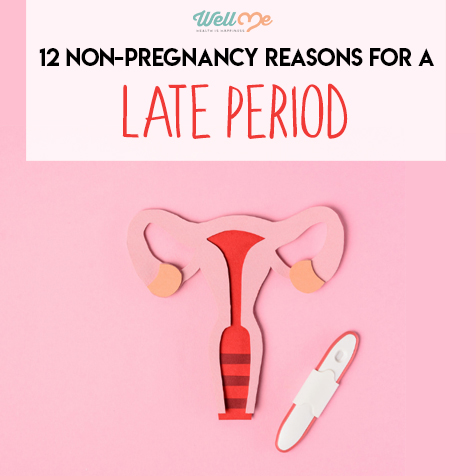
Conclusion
Hopefully, you have found a clear reason for your late period and can decide rationally what to do next using our comprehensive guide. We all live through this experience at least once and may even experience more than one of these reasons for it. And if need be, your doctor can help you get your late period back on track!

Share this Image On Your Site
References
- [1] https://www.summitmedicalgroup.com/library/pediatric_health/hhg_period_late_or_missed/
- [2] https://www.summitmedicalgroup.com/library/pediatric_health/hhg_period_late_or_missed/
- [3] https://www.everydayhealth.com/pms/irregular-periods.aspx
- [4] https://www.ncbi.nlm.nih.gov/pmc/articles/PMC5801702/
- [5] https://www.mayoclinic.org/healthy-lifestyle/stress-management/in-depth/stress/art-20046037
- [6] https://www.plannedparenthood.org/learn/teens/ask-experts/can-stress-really-delay-your-menstrual-cycle
- [7] https://jcdr.net/article_fulltext.asp?issn=0973-709x&year=2015&volume=9&issue=3&page=QC01&issn=0973-709x&id=5611
- [8] https://www.ncbi.nlm.nih.gov/pmc/articles/PMC4413117/
- [9] https://www.ncbi.nlm.nih.gov/pmc/articles/PMC4413117/
- [10] https://academic.oup.com/jcem/article/84/3/873/2864105
- [11] https://academic.oup.com/jcem/article/84/3/873/2864105
- [12] https://www.nhs.uk/conditions/stopped-or-missed-periods/
- [13] https://www.nhs.uk/conditions/obesity/
- [14] https://www.nhs.uk/conditions/obesity/
- [15] https://www.nhs.uk/conditions/stopped-or-missed-periods/
- [16] https://www.nhs.uk/conditions/obesity/
- [17] https://www.nhs.uk/conditions/obesity/
- [18] https://www.nhs.uk/conditions/obesity/
- [19] https://www.pcosdietsupport.com/pcos-symptoms/9-ways-to-kick-start-your-period-with-pcos/
- [20] https://pcos.com/absent-menstruation-amenorrhea-and-pcos/
- [21] https://pcos.com/absent-menstruation-amenorrhea-and-pcos/
- [22] https://www.pcosdietsupport.com/pcos-symptoms/9-ways-to-kick-start-your-period-with-pcos/
- [23] https://www.pcosdietsupport.com/pcos-symptoms/9-ways-to-kick-start-your-period-with-pcos/
- [24] https://report.nih.gov/biennialreport0607/pdf/NIH_BR_Ch2_chronic.pdf
- [25] https://www.ncbi.nlm.nih.gov/pmc/articles/PMC3107848/
- [26] https://jamanetwork.com/journals/jamainternalmedicine/fullarticle/208109
- [27] https://jamanetwork.com/journals/jamainternalmedicine/fullarticle/208109
- [28] https://www.sciencedirect.com/sdfe/pdf/download/eid/1-s2.0-S0849583116304037/first-page-pdf
- [29] https://www.health.harvard.edu/womens-health/perimenopause-rocky-road-to-menopause
- [30] https://www.health.harvard.edu/womens-health/perimenopause-rocky-road-to-menopause
- [31] https://www.health.harvard.edu/womens-health/perimenopause-rocky-road-to-menopause
- [32] https://www.ncbi.nlm.nih.gov/pmc/articles/PMC4818825/
- [33] https://www.ncbi.nlm.nih.gov/pubmed/10468932
- [34] https://www.menstruationresearch.org/2016/02/26/what-your-period-is-trying-to-tell-you-about-your-thyroid/
- [35] https://www.ncbi.nlm.nih.gov/pubmed/26620017
- [36] https://www.menstruationresearch.org/2016/02/26/what-your-period-is-trying-to-tell-you-about-your-thyroid/
- [37] https://www.menstruationresearch.org/2016/02/26/what-your-period-is-trying-to-tell-you-about-your-thyroid/
- [38] https://www.pituitary.org.uk/information/what-is-the-pituitary-gland/
- [39]https://www.niddk.nih.gov/health-information/endocrine-diseases/prolactinoma
- [40] https://www.mayoclinic.org/diseases-conditions/prolactinoma/symptoms-causes/syc-20376958
- [41] https://www.pituitary.org.uk/information/what-is-the-pituitary-gland/
- [42] https://www.ncbi.nlm.nih.gov/pmc/articles/PMC5477442/
- [43] https://www.ncbi.nlm.nih.gov/pmc/articles/PMC5477442/
- [44] https://www.niddk.nih.gov/health-information/endocrine-diseases/prolactinoma
- [45] https://www.niddk.nih.gov/health-information/endocrine-diseases/prolactinoma
- [46] https://www.ncbi.nlm.nih.gov/pmc/articles/PMC5477442/
- [47] https://www.ncbi.nlm.nih.gov/pmc/articles/PMC5477442/
- [48] https://www.ncbi.nlm.nih.gov/pmc/articles/PMC5477442/
- [49] https://www.ncbi.nlm.nih.gov/pubmed/12266509
- [50] https://www.ncbi.nlm.nih.gov/pubmed/23852908
- [51] https://www.ncbi.nlm.nih.gov/pubmed/23852908
- [52] https://www.mayoclinic.org/healthy-lifestyle/birth-control/in-depth/birth-control-pill/art-20045136
- [53] https://www.ncbi.nlm.nih.gov/pubmed/945301
- [54] https://www.ncbi.nlm.nih.gov/pubmed/22534402
- [55] https://www.ncbi.nlm.nih.gov/pubmed/25797888
- [56] http://chemocare.com/chemotherapy/side-effects/menopause-chemotherapy.aspx
- [57] https://www.ncbi.nlm.nih.gov/pubmed/25797888
- [58] http://chemocare.com/chemotherapy/side-effects/menopause-chemotherapy.aspx
- [59] https://www.ncbi.nlm.nih.gov/pubmed/25797888
- [60] http://psycnet.apa.org/record/1971-24368-001
- [61] http://psycnet.apa.org/record/1971-24368-001
- [62] http://psycnet.apa.org/record/1971-24368-001
- [63] https://www.ncbi.nlm.nih.gov/pubmed/9916957
- [64] https://www.ncbi.nlm.nih.gov/pubmed/9916957
- [65] https://www.ncbi.nlm.nih.gov/pmc/articles/PMC5801702/
- [66] https://www.ncbi.nlm.nih.gov/pubmed/9916957
- [67] https://www.ncbi.nlm.nih.gov/pubmed/9916957
- [68] https://www.ncbi.nlm.nih.gov/pmc/articles/PMC5801702/
- [69] https://www.ncbi.nlm.nih.gov/pubmed/9916957
- [70] https://www.health.harvard.edu/blog/quitting-smoking-second-half-menstrual-cycle-may-help-women-kick-habit-201607219978
- [71] https://www.health.harvard.edu/blog/quitting-smoking-second-half-menstrual-cycle-may-help-women-kick-habit-201607219978
- [72 https://www.health.harvard.edu/womens-health/when-you-visit-your-doctor-irregular-menstrual-periods
- [73] https://www.nichd.nih.gov/health/topics/menstruation/conditioninfo/diagnosed

